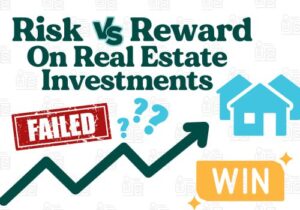Risk vs. Reward on The Balancing Act in Real Estate Investments

Crucial Considerations for Assessing Risks in Real Estate Investments
February 1, 2024
How Astute Investors Can Increase Returns on High-Return Real Estate
February 2, 2024Risk vs. Reward on Real Estate Investments. From the dangerous world of real estate investing, where rash decisions may make or ruin your success, greetings. In such a setting, the careful balancing act between reward and hazard assumes an important position. Join us as we go straight into “The Balancing Act in Real Estate Investments,” an interesting exploration of the plans, challenges, and achievements encountered by investors pursuing financial rewards. The art of real estate investing in this dynamic climate, where the promise of large earnings is tempered by inherent risks, is revealed through our removal of the fine threads that connect risk and reward. Prepare yourself for an eye-opening journey where careful consideration and wise decision-making help the real estate business achieve the perfect balance between reward and risk.
Situation of the Market
The situation of the economy has an impact on real estate markets, which can be seasonal. A recession may result in lower property values and rental income. Values and rental revenue typically climb in a booming economy, offering chances for appreciation and higher returns.
Rates of Interest and Risk vs. Reward on Real Estate Investments
The real estate market is seriously affected by the current interest rates. As borrowing becomes more affordable, lower interest rates often boost demand and may even raise property values. On the other hand, increased borrowing rates could deter investors and consumers, which would cause the market to slow down.
The location
There are a number of dangers related to investing in an unstable or failing community, including decreased property values, increased crime rates, and trouble finding tenants. Picking a place with solid economic foundations, first-rate amenities, and room to expand can raise property values and increase demand for rentals.
Supply and Demand in the Market
Study how the local real estate market’s supply and demand are balanced. An excess of available properties may result in reduced rental revenue and property values, but an absence of available homes may provide investors with an advantage over rivals.
Credit and Debt Management
If the market turns bad and it becomes difficult to make payments on loans, using too much leverage might increase losses. In a rising market, careful application of leverage can increase profits because the investor’s capital grows more quickly than the value of the property as a whole.
Review finances on a regular basis
Review your rental income, financial status, and market conditions on a regular basis. Being active allows you to decide wisely and change your plan of action as needed. Create and keep an emergency fund to help with unexpected expenses or hard times when money is tight. This offers loan payments a safety net.
Type of Property and Risk vs. Reward on Real Estate Investments
Some property kinds can be more prone to shifts in consumer behavior or economic downturns. Particularly during economic downturns, commercial properties could encounter difficulties. You can reduce risk and guarantee steady profits by concentrating on in-demand property types or by diversifying across a variety of property kinds.
Types of In-Demand Properties
Pay attention to property groups that are in high demand all the time, such affordable housing, commercial spaces in prime locations, or properties that meet specific demographic trends. Analyze the cash flow of any possible investment property in detail. Making educated selections requires an understanding of the potential earnings and running expenses
Operations and Management
Unexpected maintenance problems, careless management, or a lack of monitoring can have a negative effect on cash flow and property value. Effective tenant relationships, prompt property care, and efficient management techniques can raise the property’s value and total return.

Sustainability of the Environment
Think about putting sustainable methods into effect. In the long run, this would not only save money, but it might also draw in renters who care about the environment. Evaluate the operations and property management performance on a regular basis. Analyze the strategies’ efficiency, identify areas that need work, and make the required changes.
Legal and Regulatory Risks
A real estate investment’s profitability may be affected by changes to tax laws, zoning ordinances, or other legal factors. Understanding beneficial regulations can lead to possible possibilities, and staying updated about and responding to regulatory changes can help avoid dangers.
Governmental Programs and Incentives
Keep up with any government initiatives or incentives that could help real estate investing. Some development or upgrades to real estate may be qualified for tax rebates or other financial incentives in some areas. Develop a good relationship with community members and local government. Participating actively in the community might occasionally provide early warning signs of future regulation changes.
Market Stability and Risk vs. Reward on Real Estate Investments
Because real estate is a highly illiquid asset, it may take some time to sell, particularly in a bear market. While short-term investors may discover chances in market swings, long-term investors may benefit from the possibility for property appreciation and rental revenue.
Flexibility and Risk vs. Reward on Real Estate Investments
Long-term investors that are successful stay flexible in response to shifting market conditions. Even if they might have a basic plan, long-term success depends on their ability to adapt in response to market developments. For more details please download Belwood app here.
Due diligence and market research
Making bad investing decisions might result from a lack of study and due investigation. Identifying profitable opportunities and comprehending potential hazards are more likely when comprehensive market research and due diligence are carried out. Please visit here for property investment
Backup Plans with Risk vs. Reward on Real Estate Investments
Create backup plans in case something unexpected happens or the market conditions change. This might include using cash reserves or different tactics. Hire experts in particular fields, such as property managers, inspectors, and real estate brokers. For more details please download Belwood app here.
In real estate, striking a balance between risk and profit involves careful planning and research. Achieving a favorable risk-reward profile requires having a defined investment strategy, remaining educated about market circumstances, and diversifying your investments. Additionally, investors need to be ready to modify their plans in response to shifting economic and market situations. Please call us: 833-826-8366.
